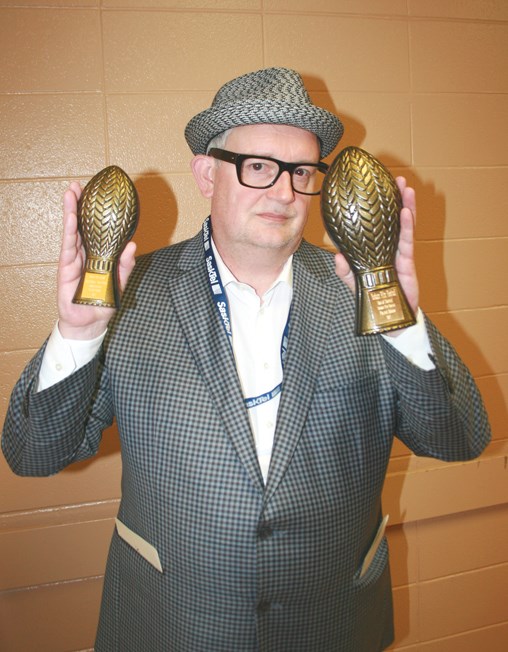While two films would carry home multiple Golden Sheaf Awards following Saturday’s Yorkton Film Festival Gala Saturday, it would be a 15-minute documentary that took home Best of Festival.
Fix and Release from Scott Dobson took the big prize.
“This is really unexpected,” said Dobson in accepting the major award of the festival, adding later he had not prepared for the possibility of the big award.
“Fix and Release explores the Ontario Turtle Conservation Centre, a small turtle trauma centre in Peterborough Ontario Canada as it fights to even the odds for survival that freshwater turtles face in a modern world,” details the YFF website. “Most turtle species in Canada are endangered due to loss of habitat and collisions with cars and boats. Dr. Sue Carstairs leads a team of dedicated staff and volunteers as they develop their own groundbreaking approach to reptile medicine. This visually beautiful film shows turtles in a way that few have seen before – highlighting their amazing ability to recover from catastrophic injury and hinting that these ancient creatures may be more complex than previously thought. Turtles are vital for healthy wetlands and every saved turtle makes a difference. As Dr. Carstairs says, “We are saving the world one turtle at a time”.”
Dobson said the win, to go along with the Short Subject – Fiction Award earlier in the evening was special in the sense the Yorkton Festival was at least, in part, the reason he went into filmmaking. He related that when only 14 he read a story about the Yorkton event.
“It was 40 years ago about now I read that story … It really intrigued me,” he said, adding that in Grade 9 he and two friends started a film club at their school, and with $250 in funding and a Super 8 camera, they began making films.
While none of the films made the festival, “All three of us went on to careers in media in one way or another,” said Dobson.
The long-time connection makes the awards this year very special.
“I love the festival,” he said, reiterating the story he read as a 14-year-old was a big part of his initial interest in film, adding through the years he has entered other films, but never captured the big award.
So why this year?
Dobson said while the film looks at a group working to save injured turtles, there is an underlying story of hope he believes may have resonated with judges.
People may not be able to change all the ills of the world, but if this group can save a turtle at a time others can make a difference too.
“If they can do it, we can do it,” he said.
The Ruth Shaw Award for Best of Saskatchewan went to Gas Can from director Mattias Graham.
Gas Can is a short film about a Cree family in 1970s Saskatchewan on their way to a new life in the city. Supported by the Saskatchewan Arts Board, the Saskatchewan Filmpool Co-operative, and IndieGoGo Backers.
“It’s a bit dream like,” said Graham in accepting the award.
Later, in an interview Graham said the award would always be something special as his first as a filmmaker.
But, the award is in some respects was less about confirming the Gas Can project than it was about firing Graham’s passion to get back into filming.
“You’re always working for the next project,” he said, adding he is already talking to his team “about what we’re hoping to do next.”
I Am the Blues, a film screened opening night of the festival, was a multiple award winner Saturday taking the Documentary Point of View Award and Director – Non-Fiction Award for director Daniel Cross.
I Am the Blues is about the last remaining blues musicians, many in their 80’s, documenting their historic songs and fantastic stories, filming the last originals before time runs out. Over the past 3 years I have filmed throughout Louisiana and Mississippi with many of the last original blues musicians, most of them in their 80s. Who, despite being inducted into the Blues Hall of Fame, had to give up their music careers to get a job and make a living.
The award for Cross, a long-time supporter of the local festival, was quick to share the award with his contemporaries, saying he wanted to recognize “all the directors who are here … This is what it’s about.”
Cross said awards always help in terms of showing that the efforts of filmmakers are being appreciated. In his own case he related that in 1990 with a Super 8 camera he shot “the first film I ever made, and it made me a filmmaker.”
But when the decision to go to film school was made Cross admitted his parents thought he might be better off “to get a job.”
Then Cross won his first Golden Sheaf Award, and his parents began to understand his passion, and his career.
“They could visualize that it’s real,” he told the Awards Gala audience.
Cross said that is the great thing about the Yorkton festival, that through the years so many people have won Golden Sheaf Awards, and that has “made them filmmakers.”
Show and Tell from Sixth Avenue Productions was the other multi-award winner at this year’s festival.
“When Naya, an eight-year-old recent Lebanese immigrant, is chosen to perform a story she wrote at an upcoming school recital she is thrilled until she realizes her family will attend wearing the Muslim Hijab so she tries to keep the event a secret,” detailed a film synopsis.
The film took home the awards for Short Subject – Fiction, and the Norman and Margaret Jewison Foundation supported Director- Fiction for Reem Morsi.
The RBC Foundation funded Emerging Filmmaker award, and $1,000 also went to Morsi.



